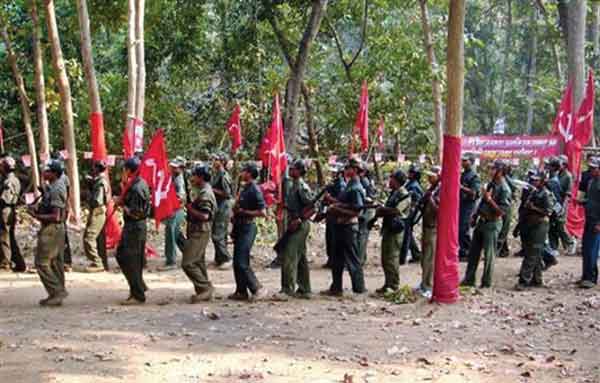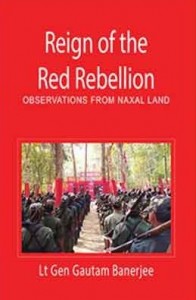Having murdered the leading Congress party functionaries in Chattisgarh and celebrating that macabre act like the savages do, the Maoists have now elaborated their ‘hit list’ of politicians and police officials whom they plan to murder at the first opportunity. Earlier, they have shown their ‘character’ by booby trapping the dead and injured policemen. Thus in one despicable sweep, a rebellion which had found wide endorsement of its cause if not its methods, has turned itself into a terrorist outfit. For a true revolutionary, there could not have been a morally degenerating ‘fall’ more dismaying. Thus had departed a disillusioned Kanu Sanyal after all, the founder of CPI (ML).
…the present lot of so called Maoists are no better than the unscrupulous lot of exploiters of the have-not’s whom they wish to ‘correct’ or eliminate.
Fall from Revolutionary Grace
Revolutionaries do not depend on hit lists to further their cause. And if they have to assassinate someone, they do not indulge in ‘blood dance’ as the Maoist cadres are reported to have performed after torturing their victims to death. A rebellion, to be seen as distinct from terrorism or downright madness, has to remain within certain bounds of probity even when engaged in acts contrary to social and legal norms.
To succeed to any degree, a rebellion does not allow its moral plank to rot. Conversely, as the history records, intimidation and savagery can not be a harbinger of change. Mao Zedong must be cursing these outlaws for invoking him only to sully his name, for he did not propagate any hit list of personalities; neither did Lenin, Castro or Che Guevara. Such lists are advertised by nihilist groups and mindless fanatics, and such people do not make revolutionaries; their revolutionary pretentions fail in the long run. Therefore by propagating a ‘hit list’ after indulging in celebratory murders, and booby trapping the injured and the dead, the outfit remains neither Maoist nor an ideology based revolution.
The hit list is sought to be justified by the assertion that there are persons somewhat vocal – even if in trepidation – in their opposition to Maoist methods, and therefore are liable to be treated as ‘enemies’ of what is claimed to be a peoples’ revolution. That assertion is of course ludicrous because: firstly, none of the named, indeed none whosoever, has really had shown the heart, in the real sense and in all seriousness, to confront the Maoist rebellion; and secondly, such fellows are no more of enemies of the cause as the Maoists themselves are. Yes, when it comes to anti-social acts, corruption, highhandedness and injustice, the present lot of so called Maoists are no better than the unscrupulous lot of exploiters of the have-not’s whom they wish to ‘correct’ or eliminate.
People living in Maoist influenced areas do not see the Maoist control as an aberration, neither do they long to be released from their rebellious clutch.
By falling prey to diabolic means in contravention to Mao’s teachings, the Maoist rebellion in India has taken its first step towards ignominy and defeat. For those who wish to be rid of this menace, this must come as music to ears. Conversely, for those well meaning part-radicals who wish to see the cleansing of a system so callous, this development must be heart-breaking, for they will have wait indefinitely for the coming of redeeming revolution.
Saviours versus Tormentors
Maoist activities go on unhindered because of two reasons:-
One is that ever since the known past, the affected areas had been administered more in exception than as a rule, be it the days of local rajas, zamindars, head-men or the agents of the government. Even in post-independence period, political opportunists have shown little interest in local affairs due to its short voter lists. Further, what little administrative focus there had been, that was directed, not at elevating the people and their lives, but on exploitation of natural resources. It would therefore not be wrong to view that kind of mechanism as nothing more than a ‘system of brokerage’. Maoists have taken advantage of that void and have assumed the much needed role of dedicated arbitrators of their routine problems. These problems relate to recovery of wages unpaid by ‘outsider’ employers, fixing reasonable wage rates, receipt of due compensation against displacement or share cropping, prevention of extortion from revenue and police officials, working of usually non-functional health centres where existing, enforcement of entitlement schemes like MNERGA against total loot, etc. Resultantly, people living in Maoist influenced areas do not see the Maoist control as an aberration, neither do they long to be released from their rebellious clutch.
| eBook edition available | |
| Reign of the Red Rebellion | |
Two, to the locals, Maoists are their boys and girls, who live permanently among them, observing the same culture, not adding to but solving some of their difficulties, particularly in securing better economic returns from their trade and safety from official harassment. Conversely, the state is represented just by occasional visitations of the police, patwari and prospectors. The state’s other citizen-dedicated departments have never appeared in any case – earlier because of their ‘right’ not to work, and presently on the excuse of Maoist threat. Further, whenever the state-functionaries did appear, they brought with them trouble – labour unpaid, hospitality forced upon, bribes demanded, chicken eaten, women harassed – before vanishing after having made a nuisance of themselves. Obviously, people are least bothered by the Maoist’s unconstitutional acts – extortion and murder of persons they do not relate to.
Maoists do not ask for secession, nor are their demands, at least formally, any different from what the constitution guarantees to the Indian citizens. Yes, they wish to change the system of governance, not by democratic means, but by unconstitutional use of violence.
Thus far, the Maoist ‘fish’ has thrived in conducive ‘waters’. Barbarism, however, is heating up that water. That offers an opportunity to the state to defeat the rebellion – as it happened in Punjab, Tripura, Mizoram and to some extent, in Nagaland.
Coalition of the State and the People
Barbaric acts tend to cascade and spill over. Therefore, at one juncture, when the common man feels tormented, it could spell the Maoist doom. If managed effectively, such a situation would allow the state to find its feet – which presently it is not being allowed to – in winning the people’s endorsement. Indeed, in most instances the world over, successful suppression of rebellion has been occasioned by highhandedness of rebels that drove common people to join the state in countering it. One such opportunity came when more that a dozen contending groups – including the Salwan Judum, ‘Tritiya Sammelan Prastuti Committee’, ‘Pratirodh Bahini’, the ‘Marxist-Leninist Committee’, ‘Lal Jhanda Party’ etc. – emerged. Unfortunately, there was no effort to strengthen these; instead the most prominent one, Salwan Judum, was first poisoned, then misused and finally decimated by the state itself. That has emboldened the Maoists, made their threats more credible and imposed caution upon the other factions – psychology, after all, nurtures a rebellion.
Many of the Maoist methods are already beginning to be seen by the people as acts of highhandedness. One, the sham of ‘governance’ that the Maoists claim to have established in their ‘liberated areas’ stand demolished; two, their inability to garner the expected level of finances, weaponry etc. has exposed their limitations; and three, arrogant diktats of the ‘area commanders’ – rebellion’s main pillar – have made most locals turn sceptic of Maoist intentions. Barbaric acts would further expose their diabolic characteristics. Indian state would be wise to seize that opportunity.
Basic Questions
That brings up certain basic questions, as discussed in the following paragraphs. To be rid of the Maoist menace, answers to these have to be pondered at.
The first question to be considered is that as to why should the Maoists be considered a threat to the nation? There are two considerations in this matter. One, Maoists do not ask for secession, nor are their demands, at least formally, any different from what the constitution guarantees to the Indian citizens. Yes, they wish to change the system of governance, not by democratic means, but by unconstitutional use of violence. That makes them anti-nationals, albeit politically oriented ones. Two, barring occasional forays to attack the state administration, Maoist activities are so far confined to those areas where the footprints of the state administration do not exist. Truly, the Maoists have taken control of the vacuums left by the state but are yet far away from displacing the state authority where it exists.







Govt behind Parliament attack, 26/11: Ishrat probe officer
TNN | Jul 14, 2013, 12.30 AM IST
RELATED
Ishrat Jahan case: Senior Gujarat IPS officer declared absconder
Supreme Court rejects Pandey’s plea in Ishrat Jahan case
Contempt petition filed against Jaitley in Ishrat Jahan case
Guilty should be punished, facts are facts: Shinde on Ishrat Jahan ca…
We are probing all angles in Ishrat Jahan case: CBI director
.
NEW DELHI: In what is certain to escalate the already vicious fight between the CBI and the IB over the IshratJahan “fake encounter case”, a former home ministry officer has alleged that a member of the CBI-SIT team had accused incumbent governments of “orchestrating” the terror attack on Parliament and the 26/11 carnage in Mumbai.
R V S Mani, who as home ministry under-secretary signed the affidavits submitted in court in the alleged encounter case, has said that Satish Verma, until recently a part of the CBI-SIT probe team, told him that both the terror attacks were set up “with the objective of strengthening the counter-terror legislation (sic)”.
Mani has said that Verma “…narrated that the 13.12. 2001(attack on Parliament) was followed by Pota (Prevention of Terrorist Activities Act) and 26/11 2008 (terrorists’ siege of Mumbai) was followed by amendment to the UAPA (Unlawful Activities Prevention Act).”
The official has alleged Verma levelled the damaging charge while debunking IB’s inputs labelling the three killed with Ishrat in the June 2004 encounter as Lashkar terrorists.
Contacted by TOI, Verma refused to comment. “I don’t know what the complaint is, made when and to whom. Nor am I interested in knowing. I cannot speak to the media on such matters. Ask the CBI,” said the Gujarat cadre IPS officer who after being relieved from the SIT is working as principal of the Junagadh Police Training College.
Mani, currently posted as deputy land and development officer in the urban development ministry, has written to his seniors that he reto